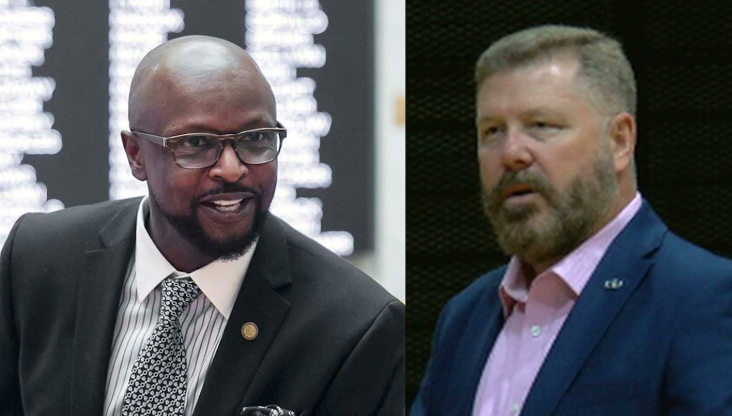District 1: Crawford seeks 7th term; Hodges attempts jump from statehouse to Congress
by October 9, 2022 3:38 pm 1,780 views

State Rep. Monte Hodges (D) and U.S. Rep. Rick Crawford (R).
U.S. Rep. Rick Crawford, R-Jonesboro, is seeking a seventh term to Congress, while his challenger, State Rep. Monte Hodges, D-Blytheville, is hoping to unseat him after his near-decade of service in the Arkansas General Assembly.
Appearing on this week’s editions of Capitol View and Talk Business & Politics, Crawford and Hodges laid out their priorities and contrasts.
Crawford, first elected in 2010, said that despite a booming steel industry in Northeast Arkansas and positives in the agricultural community, First District Arkansans are not faring well due to higher gas prices and rising interest rates.
“You talk to people who are looking at buying a new home or paying for gas, just overnight the gas prices went up 35 cents here in Jonesboro. You’re seeing a little bit of slowdown in real estate, new homes, for example, we’re seeing interest rates topping 7% for mortgages. That’s not good conditions to continue to see that economic activity,” Crawford said.
“We are in a recession, so now we’re approaching stagflation. We haven’t seen this since the [President Jimmy] Carter administration back in the late ’70s, early 80s when we were looking at home mortgage interest rates topping more than 10% and double digit inflation. So I don’t think we have escaped the economic fallout of the Biden administration,” he added.
Hodges, who was elected to the statehouse in 2012, said he would be more “present” in the district than Crawford, if he’s elected to Congress. As he travels the 31 counties in the Delta, he sees the need for more infrastructure investment. Citing a bipartisan bill that Crawford voted against, Hodges said he would have voted for the funding.
“Infrastructure affects so much and the bipartisan bill that was brought up, it showed that it was an agreement from across the aisle, that this was something that was good for us. And so, that brought almost $4 billion to the state of Arkansas,” Hodges said. “Those things affect not only our roads and bridges, but our children who have tablets that they have to take home, our agriculture community, which a lot of these combines and the very expensive equipment that they use are computerized, and things of that nature.”
Hodges said he would have also supported a bill that Crawford voted against that he believes would have lowered the cost of insulin.
“We’re in a poor state, we’re in a state where people are unhealthy, you know, so people have to make a decision, am I going to put groceries on my table or am I going to get my prescription drugs, insulin filled, things of that nature. These are things that help people,” he added.
Abortion is another issue that distinctively separates the two candidates.
Crawford said the Dobbs decision overturning Roe v. Wade was properly decided by the U.S. Supreme Court earlier this year.
“I think the Dobbs decision was correct in that it returned that decision back to the state level. And so I support that. The state of Arkansas is going to do what the state of Arkansas wants and is reflective of the electorate here. And I think that’s the appropriate course. And so we’re going to have a little bit of different law than what they have in Massachusetts or Illinois, for example. But this is what our representatives are tasked with,” Crawford said.
Since it is a state decision, he’s not sure if a national abortion ban is something he would support.
“It depends an awful lot on the language. I mean, it’s hard for me to speculate right now. I know that [Sen.] Lindsay Graham is talking about that, but I haven’t read any language to that effect. I tend to want to default to the 10th Amendment and the states’ rights to do what they want to do that’s not expressly addressed in the U.S. Constitution, and this is not expressly addressed in the U.S. Constitution. So therefore, I’m thinking it would almost require a constitutional amendment and that’s a heavy lift,” Crawford added.
Hodges supports reproductive rights for women, and he’s worried about the Supreme Court’s reversal of precedent of long-settled cases.
“This is a choice, this is a woman’s choice. This is a woman’s health. For me to dictate a woman’s reproduction rights, I just think is wrong and it is a slippery slope. You know, if we can reverse Roe v. Wade, which has been in law forever, what about civil rights? What about laws that protect people that look like me that have been put in place? So we can really get into some issues by changing laws that affect the lives of people. It is not a Democrat thing to me. It’s a woman’s right issue for me,” Hodges said.
You can watch videos of both men’s interviews below.
